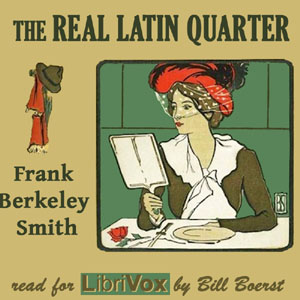
“Cocher, drive to the rue Falguière”–this in my best restaurant French.
The man with the varnished hat shrugged his shoulders, and raised his eyebrows in doubt. He evidently had never heard of the rue Falguière.
“Yes, rue Falguière, the old rue des Fourneaux,” I continued.
Cabby’s face broke out into a smile. “Ah, oui, oui, le Quartier Latin.”
And it was at the end of this crooked street, through a lane that led into a half court flanked by a row of studio buildings, and up one pair of dingy waxed steps, that I found a door bearing the name of the author of the following pages–his visiting card impaled on a tack. He was in his shirt-sleeves–the thermometer stood at 90° outside–working at his desk, surrounded by half-finished sketches and manuscript.
The man himself I had met before–I had known him for years, in fact–but the surroundings were new to me. So too were his methods of work.
Nowadays when a man would write of the Siege of Peking or the relief of some South African town with the unpronounceable name, his habit is to rent a room on an up-town avenue, move in an inkstand and pad, and a collection of illustrated papers and encyclopedias. This writer on the rue Falguière chose a different plan. He would come back year after year, and study his subject and compile his impressions of the Quarter in the very atmosphere of the place itself; within a stone’s throw of the Luxembourg Gardens and the Panthéon; near the cafés and the Bullier; next door, if you please, to the public laundry where his washerwoman pays a few sous for the privilege of pounding his clothes into holes.
It all seemed very real to me, as I sat beside him and watched him at work. The method delighted me. I have similar ideas myself about the value of his kind of study in out-door sketching, compared with the labored work of the studio, and I have most positive opinions regarding the quality which comes of it.
If then the pages which here follow have in them any of the true inwardness of the life they are meant to portray, it is due, I feel sure, as much to the attitude of the author toward his subject, as much to his ability to seize, retain, and express these instantaneous impressions, these flash pictures caught on the spot, as to any other merit which they may possess.
Nothing can be made really _real_ without it.
F. HOPKINSON SMITH.
Paris, August, 1901.
(from Introduction)

Other Audiobook
Audiobook: Briefe aus dem Gefängnis
Rosa Luxemburg war eine bedeutende Vertreterin der europäischen Arbeiterbewegung und des proletarischen Internationalismus. Sie gehörte
Audiobook: Adventures of Peregrine Pickle (Volume I)
The Adventures of Peregrine Pickle is a picaresque novel by the Scottish author Tobias Smollett
Audiobook: Origins of Christianity
The full title of this book is The Origins of Christianity with an Outline of
Audiobook: Why do we need a public library?
Internet Archive, which hosts our audio books, is in the midst of their annual fund-raising.
Audiobook: Ramayan, Book 5
The Ramayan is an ancient Sanskrit epic. It is attributed to the Hindu sage Valmiki
Audiobook: Love Stories Volume 3
Here are 20 more love stories under an hour each, covering all kinds of experiences
Audiobook: The Soul of the Indian
“We also have a religion which was given to our forefathers, and has been handed
Audiobook: My Bible History: New Testament
A short, simple New Testament Bible History for children, but which can also be enjoyed
Audiobook: Seven and Nine years Among the Camanches and Apaches: An Autobiography
Best described as a fictional autobiography, Clark Johnson authored the following adventure to promote the
Audiobook: Weiße Nächte
Erzählt wird diese Petersburger Geschichte von einem jungen, einsamen Träumer, der aus seiner selbst geschaffenen
Audiobook: First Chapter Collection 004
LibriVox First Chapter Collection 004 – a collection of the first chapters of 15 different
Audiobook: History of the Decline and Fall of the Roman Empire Vol. II
The History of The Decline and Fall of the Roman Empire, a major literary achievement